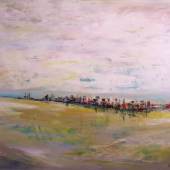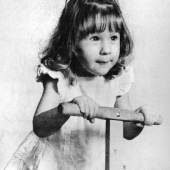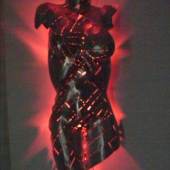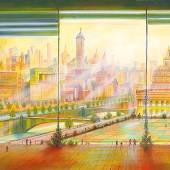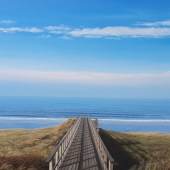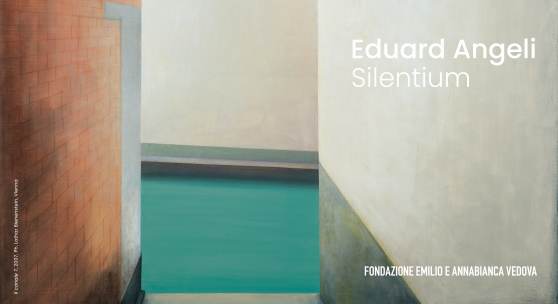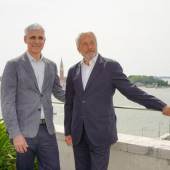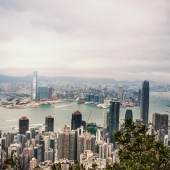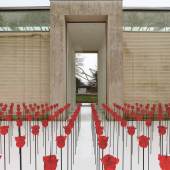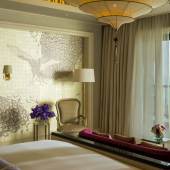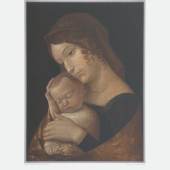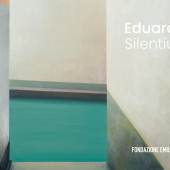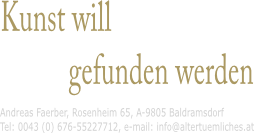Fondazione Vedova
Current exhibition Eduard Angeli. Silentium
-
Ausstellung13.04.2024 - 24.11.2024
The Fondazione Emilio e Annabianca Vedova will present Silentium, a solo show by the noted Austrian artist Eduard Angeli, curated by Philip Rylands, at the Magazzino del Sale exhibition space on the Zattere.
The exhibition consists of a representative selection of 14 works, ranging between nocturnal and daytime landscapes, interiors, and buildings. These works are characterized by an eerie stillness and the complete absence of human figures: compositions of, as it were, deafening silence, in which Venice with its inclination towards surrealism and symbolism, is a natural protagonist.
On 12 November 2019, Venice suffered the most severe flooding (acqua alta) since the 1960s. Over those traumatic days, the basement of the house in which Eduard Angeli had lived for the preceding fifteen years was submerged in salt water. The damage and wholesale destruction of many of his works dismayed him to the extent that he decided to quit the city and return to his native Vienna. The exhibition that the Fondazione Vedova is dedicating to Angeli thus marks his artistic return to the city after that painful departure.
“It has become almost traditional practice for the Fondazione Vedova to ‘compare and contrast’ exhibitions by Vedova himself and various artists,” writes the Foundation’s President, Alfredo Bianchini: “However, in this case, overstressing an Angeli-Vedova dialogue-comparison would in my view require forcing perhaps spurious conjunctions and/or overlaps between the two artists. But one underlying premise does unite them… I refer to a recurring theme in Vedova’s work that he himself called the clash of situations. An endless clash of situations on the human journey that, put simply, encompasses the conflict between good and evil in all its meanings and manifestations. Fundamentally, Eduard Angeli's silence seems no less an irrepressible howl of dissent that reaches out to every part of the world.”
Among the works on show, The Canal 7 (2007) encapsulates the exhibition’s essential spirit, in exemplifying Angeli's mystical poetics while also symbolizing the bridge that brings him back to the Lagoon.
Another dizzying perspective painting is Fog (2018) with its central vanishing point: the view could be of the Zattere across the Giudecca Canal, with the Redentore church in the background, but that is of lesser importance than the real subject: the unknown, as represented by the fog, and the greater unknown, the afterlife, should there be one.
The works selected by curator Philip Rylands illuminate many aspects of the artist's work, from the potently absent human figures to the symbolist tension generated by his disquieting ambiances, heirs to some of the more inspired works of Giovanni Segantini or Caspar David Friedrich, as in The Lantern (2023).
When faced with Angeli's works, the emptiness, the architecture stripped of all detail, and the estranging rendering of objects, may lead the viewer to wonder where reality lies, and to place the artist in the tradition of, say, Giorgio de Chirico's metaphysical paintings. Among Angeli's 'symbolist strategies', we note the repeated detail of a The Loudspeaker (2012), a constant in his vocabulary since 1998 which has the same silent eloquence as de Chirico's mannequins, and which, introduced into a landscape otherwise devoid of any trace of human life, synthesizes that sense of loss that the artist associates with such cities as Venice and Vienna, relics of past empires.
“Standing before a painting by Eduard Angeli is like entering a dream.” Philip Rylands observes, “The place may seem familiar, but it is altered. Whether of Venice, St Petersburg or Istanbul, the topography is so estranged, the atmosphere so rarefied and the solitude so oppressive that it is as if one has been translated to a parallel world.”
One thing that is always clear in the paintings exhibited in Eduard Angeli. Silentium is how Venice remains, in Angeli's imagination, the unequivocal protagonist, capable of nourishing his inspiration with its contours dissolved in light and the geometric rigour of its irregular topography: a city always able to inspire the story that all his works tell - a poetic journey of thought, symbols, and ideas.
Eduard Angeli (Vienna, 1942) has lived and worked both in Austria and Venice. A leading light of the Austrian contemporary art scene, he studied painting and art education at the Akademie der Bildenden Künste in Vienna, under Professor Robin Christian Andersen, and History of Art at the University of Vienna. In 1965, after graduating and qualifying as a teacher, he moved to Istanbul, where he taught at the Academy of Applied Arts until 1971. Since returning to his native city he has exhibited his works in numerous shows throughout Europe. In 2003, the artist was awarded the Golden Order of Merit for his services to the state of Austria. Many of his paintings are on public display in important Austrian institutions such as the Austrian National Bank and the University of Salzburg. In 2017 the prestigious Albertina Museum in Vienna hosted a major Angeli solo exhibition.
-
20.04.2024 - 24.11.2024Launched the second edition of Biennale College Arte For young emerging artists under 30 Venezia...
-
11.05.2018 - 24.11.2018Statement Gernot Blümel Bundesminister für EU, Kunst, Kultur und Medien Seit über 120 Jahren ist...
-
11.05.2019 - 24.11.2019Statement Gernot Blümel Bundesminister für EU, Kunst, Kultur und Medien Seit über 120 Jahren ist...
-
Die politischen und geistigen Voraussetzungen machten Florenz zur Geburtsstadt der Renaissance....
-
13.04.2024 - 24.11.2024
Fondazione Emilio e Annabianca Vedova
Magazzino del Sale, Zattere 266
April 13 – November 24, 2024
Wednesday - Sunday
10.30am – 6pm
Ticket office closes at 5.30 pm
